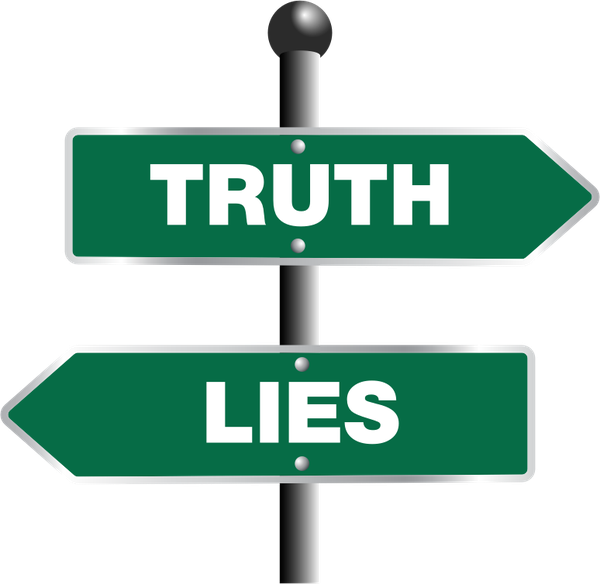Truth, lies and falsehood
In questionnaires or quizzes we use contrasting options like “Yes” and “No” or “True” and “False”. Our word choice highlights the fact that these are opposites: “Yes” cannot mean “No”; something “True” cannot be “False” and vice versa.
Truth is absolute. Truth is not relative. Claiming that something is true or “true for
you” cannot make it true if it is false. And calling something false when it is true does not make it false either.
Yet there is one feature of truth that our legal systems concentrate on that has very little to do with truth itself. When people give an affirmation or take an oath in a court of law, they are required to commit to telling not only the truth and nothing but the truth; they must tell the whole truth.[1] This goes well beyond
merely promising to speak the truth and tell no lies: it precludes the keeping of secrets.
Sometimes, this detail causes people to misunderstand God’s commitment to truth. We can feel that our legal requirement for testimony is somehow the definition of truth itself. It isn’t. God never lies, so that part of the commitment made by witnesses is covered. However, God has never said that he will tell us the whole truth. Just think about
it: since God knows everything, past, present and future, if he were to tell us the whole truth, the world would be full of books describing everything that has ever happened or will happen. Apart from the fact that there would be no room on earth to move, there would also be no place for goals, ambition, aspirations, hope, faith or anything else that describes our efforts to direct our lives. Nothing would be under our control; our inescapable future would already have been
written down, second by second. No pre-documented failure could be avoided; no event lauded as a surprise; no achievement welcomed with the common expression, “I had almost given up!”
How tedious life would be!
Fortunately for our enjoyment of life and our opportunity for satisfaction, God does not have any commitment to delivering “the whole truth” which our legal systems demand of witnesses. God knows better.
Where does this difference of approach to truth lead us?
I could write endlessly about the inconsistency of a society which compels court witnesses to tell the whole truth (while allowing them to claim only reasonable expenses) but rewards with highly-paid careers, clever people whose sole goal is to cast doubt on true evidence so that the guilty can escape scot-free. When a society abandons God,[2] the voices of evil shamelessly
promote lies – and do their best to silence inconvenient truths. Statistics are twisted into lies; so-called news filters out unwanted information and only reports biased opinion; history is rewritten to suit current trends in society; innocent blood is shed; villains are honoured; heroes are villainized. Truth becomes an enemy of the state.
Enough said.
Now for the good news. The Bible tells us that truth is very
important to God. God never lies – in fact, he hates lies.
In Proverbs 6:16-19 Solomon gives a list of things which God hates, and lies are mentioned more than once:
“There are six things that the Lord hates, seven that are an abomination to him:
• haughty eyes,
•
a lying tongue, and
• hands that shed innocent blood,
• a heart that devises wicked plans,
• feet that make haste to run to evil,
• a false witness who breathes out lies, and
• one who sows discord among brothers.”
Proverbs
6:16-19
Witnesses
Our legal systems insist that witnesses must tell the truth, which agrees with the ninth of the Ten Commandments:
“You shall not bear false witness against your neighbour.”
Exodus 20:16
Under
God’s laws, witnesses must truly report what they saw. This principle is reiterated in Solomon’s book of Proverbs:
“Whoever speaks the truth gives honest evidence, but a false witness utters deceit.”
Proverbs 12:17
The book also likens a false witness to a dangerous weapon:
“A man who bears false witness against his neighbour is like a war club, or a sword, or a sharp arrow.”
Proverbs 25:18
In the Old Testament, the first book of Kings tells us about a
king called Ahab who sought to buy a vineyard near his palace, intending to turn it into a vegetable garden.[3] When the owner, Naboth, refused to sell it, King Ahab complained to his evil queen, Jezebel – who was never short of vindictive ideas for getting what she wanted. She promptly ordered the leaders of the town to honour Naboth, while at the same time arranging false witnesses to turn people against him. Jezebel’s plan worked: the witnesses lied about Naboth and he was
stoned to death along with his sons. Ahab immediately took control of the vineyard, but his corrupt behaviour didn’t go unpunished. God promised that his dynasty would come to an end because of this travesty of justice and that Jezebel would die ignominiously and be eaten by dogs. She, and her henpecked husband, got what they deserved.
God had previously said in the law of Moses that if people were caught giving false evidence so as to convict
innocent people, the false witnesses were to be punished with the same punishment as they had tried to bring upon their victims.[4]
That seems fair.
God and truth
What about God himself, then? If God hates lies, does he ever lie himself?
The simple answer is: “No.” As Paul expressed it:
“…God, who never lies…”
Titus 1:2[5]
As we have seen before in this series, such a point can be confirmed by using opposites. So, in a Psalm of David, God is described as the “God of truth”:
“Into Your hands I commit my spirit;
You have redeemed me, O LORD, God of truth.”
Psalm 31:5[6]
Interestingly, the first part of this verse is quoted by Jesus just before he died on the cross.
A message repeated frequently throughout the Bible is that truth is associated with God, and lies with idols or creature-worship (including the worship of our human intellect which is so common in science and
society today). Paul explains the situation in Romans:
“For what can be known about God is plain to them, because God has shown it to them. For his invisible attributes, namely, his eternal power and divine nature, have been clearly perceived, ever since the creation of the world, in the things that have been made. So they are without
excuse. For although they knew God, they did not honour him as God or give thanks to him, but they became futile in their thinking, and their foolish hearts were darkened. Claiming to be wise, they became fools, and exchanged the glory of the immortal God for images resembling mortal man and birds and animals and reptiles.
“Therefore God gave them up in the lusts of their hearts to impurity, to the dishonouring of their bodies among themselves, because
they exchanged the truth about God for a lie and worshipped and served the creature rather than the Creator, who is blessed forever! Amen.”
Romans 1:19-25
As Paul said, creation truly shows a creator. Explanations of creation that deny a creator are lies. Imagine an explanation of the creation of a car or a bridge or a phone that denied a designer!
Mankind
and truth
For God then, truth is a fundamental part of his character, and anyone who wants to please God has to develop their character along the same lines. In his letters, the apostle John says plenty about the value and importance of truth and contrasts it with the destructive nature of lies. One example from the first chapter is:
“If we say we have fellowship with [God] while we walk in darkness, we lie and do not practice the truth.”
1 John 1:6
Earlier, we looked at light and darkness as opposites, and John shows that the contrast between them is the same as that between truth and lies. In chapter 2, he makes it clear that he isn’t writing because his audience is ignorant, but
because they know the truth, and that lies and truth will always be in conflict. They can never agree:
“I write to you, not because you do not know the truth, but because you know it, and because no lie is of the truth.”
1 John 2:21
John also warned his audience that there are plenty of people who will try to teach them lies:
“I write these things to you about those who are trying to deceive you. But the anointing that you received from [Jesus] abides in you, and you have no need that anyone should teach you. But as his anointing teaches you about
everything—and is true and is no lie, just as it has taught you—abide in him.”
1 John 2:26-27
Truth must be clung to, while lies are to be rejected.
There are plenty of examples of people telling lies throughout the Bible, sometimes even to protect others. On many occasions there is no immediate reflection on whether their lying was good or
bad. However, God makes sure that we know exactly what he wants by spelling out the principles very clearly in many places in the Bible. He gives us life examples without a specified judgement so that we can exercise – and strengthen – our moral muscles.
"White lies"?
Our society argues that lies are sometimes necessary, or at least excusable, but if so, does that mean God lies? Remember, God cannot lie.
Paul puts God's requirement very simply:
“Therefore, having put away falsehood, let each one of you speak the truth with his neighbour, for we are members one of another.”
Ephesians 4:25
The whole truth?
For followers of
Jesus, lies are not an option. Truth is the only option. Don’t forget, however, that there is no requirement to speak the whole truth:
“Rather, speaking the truth in love, we are to grow up in every way into him who is the head, into Christ…”
Ephesians 4:15
We do not need to answer every question we are asked. Diversion is allowable. Creative evasion can be a good idea. For sure, always speak the truth, but there is no need to speak the truth cruelly. Once again, God does not tell us everything about the future. Our questions are not all answered.
“White lies” – as they are politely called – are still lies.
If we know God, truth will grow strong in us
and lies will wither. Jeremiah describes the converse of this in his society 600 years before Jesus:
“They bend their tongue like a bow; falsehood and not truth has grown strong in the land; for they proceed from evil to evil, and they do not know me, declares the Lord.”
Jeremiah 9:3
Will you choose truth or lies? It’s up to you, but don’t flirt with lies if you want to please God or become like Jesus.
Notes
[1] Wikipedia: “Sworn testimony” https://en.wikipedia.org/wiki/Sworn_testimony.
[2] See Isaiah 59 for a stark description of just such a situation in Isaiah’s time.
[3] For the full
details, including God’s punishment of Ahab’s family and Jezebel, see 1 Kings 21:1-29 and 2 Kings 9:1-10:17.
[4] Deuteronomy 19:16-21
[5] See also Numbers 23:19 and 1 Samuel 15:29.
[6] See also Deuteronomy 32:4; Psalm 26:3; Psalm 86:11; Isaiah 65:16. Note that some translations use “faithfulness” instead of “truth” in these verses. The meaning is very similar, and considering the close association between the two can help us to understand God’s consistency and reliability a
little better. It may also help us to see more clearly what faithfulness in marriage should look like.



